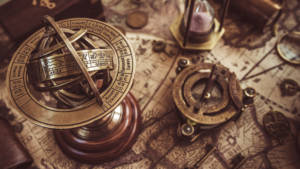Dignities: Planets’ Strengths and Weaknesses Within the Signs

A planet’s effects can be positive, powerful, negative, or hindered. These positions, or planetary dignities, reveal a lot going on beneath the surface.
If you’re like many young Canadian adults, you probably have a passing interest in astrology. You at least know your Sun sign, but you may have also looked up your chart and know what your planets’ positions mean. Yet there’s always more to learn, right? Based on the signs they inhabit, a planet’s effects can be positive, powerful, negative, or hindered. These positions, also known as planetary dignities, reveal a lot more going on beneath the surface.
What Are Dignities?
In astrology, dignities are simply shorthand for each planet’s strengths and weaknesses. Writing at The Tarot Lady, astrologer Theresa Reed discusses how dignities work. All the zodiac signs and planets have their own unique energies. These energies can blend harmoniously or clash horribly. Sometimes they enhance each other to produce powerful results. At other times, a zodiac sign’s energies diminish a planet’s nature like water being dumped onto a fire.
Dignities are these specific energy combinations. Meanwhile, a planet is said to be peregrine when it doesn’t possess any dignities at all. A peregrine state doesn’t inherently have positive or negative effects since the planet’s and sign’s influences don’t impact each other in any extreme ways.
Domicile: A Planet in Its Home Turf
Each zodiac sign is ruled by at least one planet. You can think of that sign as the planet’s “home base,” but astrologers refer to the planet as being in domicile or ruler-ship. Thanks to their compatible natures, these energies blend successfully and result in positive, natural impacts. For instance, someone with a natal Mercury in Virgo is an adept communicator with a quick intellect and ability to work with large amounts of information. Astrostyle offers a helpful list of ruling planets and their corresponding signs.
Detriment: Walking on Shaky Ground
When a planet’s in the zodiac sign opposite its domicile, astrologers say that it is in detriment. This position creates an awkward clash between the planet’s and sign’s influences, rendering the planet weaker and less effective. Some astrologers consider Saturn to be in detriment when it’s in Leo. Individuals with this placement may struggle with self-expression, confidence, and spontaneity: all Leonine traits impacted by Saturn’s restraining nature.
Exaltation: Strength in Numbers
If a planet’s influence feels the most natural in a domicile sign, then it enjoys a boost of power and strength when it’s in exaltation. Astrologers believe that this is a planet’s best possible placement because its exaltation sign multiplies and enhances its native energies. Uranus in Scorpio is one great example of this. As a planet governing innovation, technology, eccentricity, and rebellion, its presence in the ultimate sign of mystery, sexuality, and intensity magnifies its influence. Uranus was exalted in Scorpio between late 1975 and late 1981, and this confluence suggests people with unorthodox approaches to sexuality and resistance against traditional norms.
Fall: Incompatibility at Its Worst
A planet’s exaltation and fall signs can be located at opposite ends of the zodiac. When a planet’s in fall, its native energies don’t function well or at all because they’re completely incongruent with those of the sign. For instance, a Venus in Virgo within someone’s natal chart may result in a person who demonstrates love through service yet struggles with being overly critical of romantic partners. That’s because the planet of love and attraction finds its influence constricted by Virgo’s practical, precise, and analytical nature.
The Relationships Between Planets and Signs
A lot of people may know their sun signs and a few planets in their charts. However, many complex ideas are involved with a chart’s interpretation. Planetary dignity is one such concept, describing the unique relationships between each planet and the sign in which it’s present. When you’re reading your chart, look at these planet-sign positions to better understand their effects.

